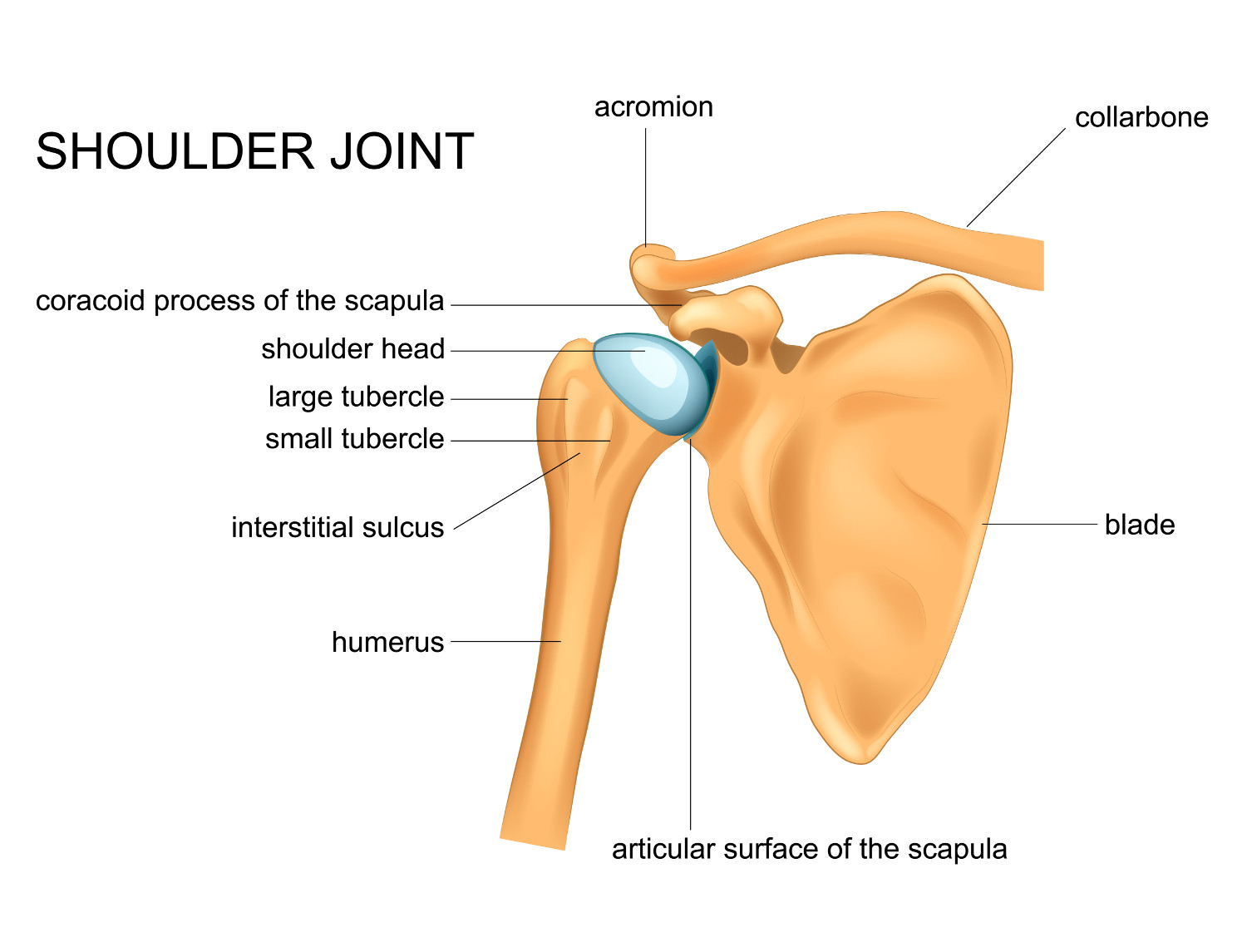
Shoulder Pain
What is Shoulder Pain?
Shoulder pain affects about 4-26% of people 1. It may appear as a mild discomfort or a deep and severe pain depending on the cause. Interestingly, an array of conditions and injuries can lead to shoulder pain. It’s not surprising since the shoulder joint is the most mobile joint in the human body. This ball-and-socket joint allows you to move your arm up over your head, out to the side, behind you, and more. Yet, with this versatility comes a high risk of injury.
The shoulder is further comprised of a variety of structures and tissues. The shoulder includes the humerus (upper arm bone), clavicle (the collarbone), and scapula (shoulder blade). Within the shoulder there are two joints; the acromioclavicular joint and the glenohumeral joint. And the rotator cuff muscles control the movement of these bones and joints. The rotator cuff is made up of four muscles, including the supraspinatus muscle, the infraspinatus muscle, the subscapularis muscle, and the teres minor muscle. The deltoids, triceps, and biceps further contribute to movements of the shoulder and upper arm. As with any part of the body, many of these structures and tissues can face wear and tear over time. In turn, this can lead to many shoulder issues, particularly those occurring after the age of 60. However, shoulder pain can also be caused by injury, repetitive use, and certain diseases.

What are the Symptoms of Shoulder Pain?
Shoulder pain symptoms include, but are not limited to, the following:
- Deep pain in the shoulder
- Pain in front or back of shoulder, sometimes in the upper arm
- Limited range of motion
- Pain when moving the shoulder
- Weakness in the upper arm and shoulder region
- Pins and needles, or numbness that may go down the arm
- Inability to move the shoulder (this is common in a shoulder dislocation injury)
When a professional diagnoses your shoulder pain, they may conduct various tests, as well as ask you about your symptoms, so that they can determine the cause of them. Depending on the severity of your shoulder pain, your healthcare provider may also have x-ray, ultrasound, CT, or MRI imaging performed.
Where is Frozen Shoulder Pain?
In the case of a frozen shoulder, which literally means you can’t move your shoulder due to built-up scar tissue, you may feel a dull ache in your shoulder. This ache and pain may get worse as your frozen shoulder progresses. It may be felt in the outer part of the shoulder or around the upper arm region. A frozen shoulder is notably characterized by the person’s inability to move their shoulder or limited ability to move their shoulder actively or passively 2.
Where is Shoulder Pain in a Heart Attack?
Interestingly, men and women may experience a heart attack differently. The majority of men will notice pain in their left shoulder during a heart attack. This pain may spread up to the chin or down the left arm.
Can Shoulder Pain be a Sign of Cancer?
Shoulder pain can be a sign of lung cancer. Although, this is very rare and frequently shoulder pain is due to other causes. However, lung cancer can cause referred pain to be felt in the shoulder region. If your shoulder pain has no set cause, it may be best to get it checked out by the doctor. Further, if you have other symptoms, such as coughing, difficulty breathing, or chest pain, it’s likely best to seek immediate medical attention 3.
Can Shoulder Pain Cause Lower Back Pain?
Shoulder pain may be associated with lower back pain. Whether or not it causes lower back pain may be a different story. Yet, the structures are fairly close together. If your posture is causing your shoulder pain, it may also lead to lower back pain, amongst other issues. This is because poor posture causes spinal misalignment and dysfunction. When one part of the spine is affected by tight muscles or structural problems, other parts may also become impacted.
Can Shoulder Pain be Caused by Stress?
One study demonstrated that neck and shoulder pain was actually higher amongst nurses with a high amount of work-related stress 4. As such, it can be inferred that stress may lead to shoulder pain. This could be due to how you hold your body during stressful times, including increased muscular tension.
Can Shoulder Pain Cause Chest Pain?
Everything in the body is connected! With the chest and shoulder in close proximity to one another, shoulder pain may result in chest pain, especially when certain structures are pulling on the tissues and muscles of the chest. However, chest pain associated with shoulder pain may be a sign of a heart attack. If you have other symptoms as well, seek out immediate medical attention.
Can Shoulder Pain Cause a Headache?
Yes, shoulder pain may cause a headache, depending on what is causing your shoulder pain in the first place. If muscles or structures are pulling on other tissues or muscles that attach to the neck and head, tension may increase, creating a headache. Interestingly, research has shown many links between neck and shoulder muscle and function and tension headaches 5.
Will Shoulder Pain Cause Neck Pain?
Shoulder pain may cause neck pain, but it doesn’t always have to. Again, this may depend on what is causing your shoulder pain, as well as whether or not you seek out treatment or take care of your shoulder through self-care activities to help it heal.
Why is there Shoulder Pain in an Ectopic Pregnancy?
Surprisingly, shoulder pain at the tip is a symptom of an ectopic pregnancy. Usually, this pain arises when you’re lying down. While scientists aren’t entirely sure why this happens, they theorize that the bleeding during an ectopic pregnancy irritates a nerve located in your diaphragm. Consequently, this may create referred pain at the tip of the shoulder, where the shoulder meets the arm.
What Causes Shoulder Pain?
According to research, the most common causes of shoulder pain include rotator cuff issues, acromioclavicular joint disease, and glenohumeral disorders 6. Impingement syndrome is also a very common cause, which occurs when the rotator cuff becomes pinched in the subacromial space within the shoulder joint. Other causes of shoulder pain are:
- Injury
- Arthritis
- Muscle strain
- Ligament sprain
- Dislocation
- Bursitis
- Bone spurs
- Broken bone
- Frozen shoulder
- Spinal cord injury
- Heart attack
- Tendonitis
- Or cancer (in rare cases)
When is Shoulder Pain Serious?
Shoulder pain becomes serious when it’s associated with symptoms, including:
- Shortness of breath
- Tightness in the chest
- Dizziness
- Neck or jaw pain
- Excessive sweating
These symptoms may be a sign of a heart attack. In this case, you need emergency medical attention. Further, if symptoms include difficulty breathing or any problems with breathing, see your doctor. If these symptoms are severe, again, get emergency medical help immediately.
How Do I Prevent Shoulder Pain?
The good news? Most incidences of shoulder pain are entirely preventable. Shoulder and postural exercises become particularly important as you age. The body naturally loses muscle mass after the age of 30. Thus, it takes more to maintain it. Use strengthening exercises to strengthen the rotator cuff muscles to support the shoulder and prevent injury or pain. It’s also important to avoid overuse of the shoulder. If you must use your shoulder joint repetitively, take breaks. Give your body adequate rest to avoid injury.
Shoulder Pain Relief: What Helps Shoulder Pain?
Will shoulder pain go away? How can you finally rid yourself of the pain once and for all? For many conditions, sufficient rest can reduce your pain. Yet, combining multiple therapeutic approaches is the safest, most efficient, and most effective way to help relieve your shoulder pain. What do these treatments entail? While your specific treatment may depend on your specific shoulder pain cause, the following provides a brief outline regarding various therapeutic and treatment approaches that may be used to treat your shoulder pain.
1. Rest Your Shoulder
As aforementioned, in many conditions, rest will help reduce your pain. However, you want to be careful with this. Some movement is always encouraged, as long as it doesn’t cause severe pain. This is especially important so that your injury or pain doesn’t develop into a frozen shoulder. A frozen shoulder occurs when scar tissue forms around the shoulder joint, preventing movement. This tends to happen when you stop using your shoulder joint after an injury or a bout of pain. Thus, incorporate small movements but don’t overdo it.
2. Physiotherapy & Exercise
Research shows that physiotherapy can help improve shoulder pain 7. Because a frozen shoulder may develop following an injury, seeing a physiotherapist can help you determine the best way to move your shoulder and avoid a frozen shoulder from happening. Your physio will prescribe exercises, as well as perform manual techniques to help heal and improve function.
3. Medications
Over-the-counter pain relievers and anti-inflammatory medicines can help relieve pain and irritation in the short term. This may help alleviate discomfort after the initial onset of injury. Yet, many studies indicate that NSAIDs should not be taken for longer than 10-14 days due to adverse health effects such as gastrointestinal issues 8.
4. Hot or Cold Therapy
Ice can help relieve pain and reduce inflammation. Heat applications can help decrease muscle tension, also reducing pain. Most hot or cold therapy devices should be applied for 10-15 minutes at a time, with 45 minutes in between applications. You may also choose to alternate between the two. Go with what feels best!
5. Shoulder Bracing or Taping
Shoulder braces and taping may be suitable in some situations. These can help remind you to avoid using your shoulder for certain activities, as well as help hold your joint in a proper position to heal fully.
6. Lifestyle Factors
Ultimately, your overall health can impact whether or not you experience pain. Self-care tactics and preventative strategies, when it comes to shoulder pain include:
Proper Sleep: Sleep is when your body repairs, heals, and regenerates. This can help heal an injury or illness. As such, you want to optimize your sleep the best you can. Ensure you practice proper sleep hygiene strategies, as well as maintain a regular sleep schedule.
Day-to-Day Movement: Include daily movement as part of your life. The body was made for this. It functions at its best when movement is included regularly. This doesn’t just mean going to the gym. It also includes incorporating movement into your daily life, such as taking the stairs or taking stretch breaks at work.
Social Network: Support matters a lot when combating pain. In fact, studies show social support contributes to reduced pain 9.
Diet: Pay close attention to what you put in your body. Become more aware of the nutrients your body needs and the foods that contain them. Again, this helps optimize your health and functioning, as well as the natural healing abilities that the body is capable of.
Relaxation: Balance is inevitably important - especially in today’s society. Give your body the proper amount of time to rest and recover. Participate in relaxing activities, such as meditation, progressive relaxation, or breathing techniques.
Depending on the severity of your situation, some shoulder pain incidents may require surgery. This is often used as a last resort when other treatment options have failed to help.
Can Massage Help with Shoulder Pain?
Massage therapy can be part of your treatment plan when it comes to ridding your life of shoulder pain. In fact, research shows massage therapy is an effective and efficient treatment at helping alleviate pain and discomfort in the shoulder 10. The type of massage therapy used will depend on what is causing your shoulder pain in the first place. If your situation involves muscular tension contributing to aggravation of pain, your massage therapist may target these muscles to alleviate tension and reduce pain. Myofascial trigger techniques may also be used to release muscle knots contributing to your pain.

Want to find out if massage therapy is right for your shoulder pain? Book an appointment. At your first session, your therapist will perform an assessment of your complaint and ask questions regarding your pain and medical history. From there, they will determine the best course of treatment. Depending on your specific situation, techniques used may vary. Your treatment may include kneading, gliding, myofascial release, trigger point therapy, frictions, compression, cross-fibre massage, and more. The best plan for your shoulder pain is to combine massage therapy with other treatment options. Rid yourself of shoulder pain once and for all through a multi-disciplinary approach!
References
1. Murphy RJ, Carr AJ. “Shoulder pain,” BMJ Clin Evid. 2010;2010:1107.
2. Cho CH, Bae KC, Kim DH. “Treatment Strategy for Frozen Shoulder.” Clin Orthop Surg. 2019 Sep;11(3):249-257.
3. Walter FM, Rubin G, Bankhead C, Morris HC, Hall N, Mills K, Dobson C, Rintoul RC, Hamilton W, Emery J. “Symptoms and other factors associated with time to diagnosis and stage of lung cancer: a prospective cohort study.” Br J Cancer. 2015 Mar 31;112 Suppl 1(Suppl 1):S6-13.
4. Bahrami-Ahmadi A, Mortazavi SA, Soleimani R, Nassiri-Kashani MH. “The effect of work- related stress on development of neck and shoulder complaints among nurses in one tertiary hospital in Iran.” Med J Islam Repub Iran. 2016 Dec 28;30:471.
5. Madsen BK, Søgaard K, Andersen LL, Skotte J, Tornøe B, Jensen RH. “Neck/shoulder function in tension-type headache patients and the effect of strength training.” J Pain Res. 2018 Feb 23;11:445-454.
6. Cadogan A, Laslett M, Hing WA, McNair PJ, Coates MH. “A prospective study of shoulder pain in primary care: prevalence of imaged pathology and response to guided diagnostic blocks.” BMC Musculoskelet Disord. 2011 May 28;12:119.
7. Murphy RJ, Carr AJ. “Shoulder pain.” BMJ Clin Evid. 2010 Jul 22;2010:1107.
8. Castellsague, J., Riera-Guardia, N., Calingaert, B. et al. “Individual NSAIDs and Upper Gastrointestinal Complications.” Drug Saf 35, 1127–1146 (2012).
9. Chiang LM, Godstein MS, Hurwitz EL, Morgenstern H. “The impact of psychosocial factors on neck pain and disability outcomes among primary care patients: results from the UCLA Neck Pain Study.” Disabil Rehabil. 2006 Nov 15;28(21):1319-29.
10. Young-Ran Y. “Effectiveness of massage therapy for shoulder pain: a systematic review and meta-analysis.” Journal of Physical Therapy Science. 2017 May; 29(5): 936–940.


